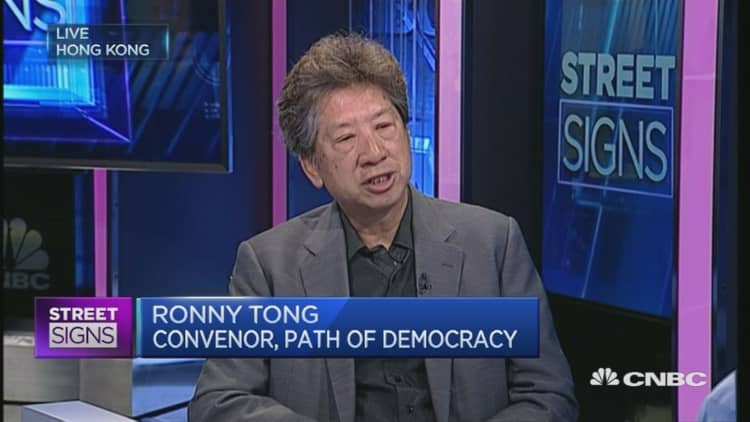
A growing independence movement in Hong Kong is worrying Beijing ahead of the special administrative region's parliamentary election this weekend.
The first such election after the 79-day protests in 2014, the polls are closely watched by the international and business communities as China tightens the screws on the former British colony.
Up for grabs will be 70 legislative council seats in the city of 7 million.
The 2014 Umbrella Movement was triggered by proposed changes to Hong Kong's electoral system that were seen to be a breach of the "One Country, Two Systems" policy, as China planned to screen all nominees in the first direct elections for Hong Kong's leader. The government eventually cleared protesters' tent city, without offering any concessions.
In the current election, Beijing's hand was again seen when Hong Kong's Electoral Affairs Commission ruled in July that all candidates must sign a pledge stating that the territory is an "inalienable" part of China.
The commission rejected applications from six candidates who were seen to be pro-independence.
Just two days before the polls open, China was still trying to pressure the Hong Kong government to disqualify another six candidates for the same reason, Reuters reported on Friday, citing sources with knowledge of the matter.
What is really at stake is the credibility of the legco that we finally elect. Whether we finally have a mandate from the people or whether this is a still a very China-run political showcase than a real talking body.Andrew SullivanHaitong International Securities’ MD of sales trading.
"If the administration here and Beijing insist on...interfering in everything left,right and center, Hong Kong is going to be in deep trouble whether it's for business or for everything else; we are very, very worried," Democratic Party chairwoman Emily Lau told CNBC's "Squawk Box".
The pro-independence movement, she suggested, was due to a loss in trust and confidence in the administration of chief executive Leung Chun-ying.
"It's something quite new. For many years, there hasn't been such a movement, so people say it's CY Leung and his administration, and Beijing's intervention which has triggered the call for independence," said Lau.
Hong Kong's political paralysis and the mainland's growing influence in the city come against a backdrop of an economic slowdown as hinterland China undergoes a transition itself. This has sparked disenchantment among many of the Hong Kong's residents who feel disenfranchised from the business and political elite.
"Localist" and pro-independence movements have been on the rise in Hong Kong recently, particularly among young people.
Lau said Beijing's attempts to stamp out free speech would keep tensions high.
"If they use...repressive methods, it will not only make the young people angry, it will antagonize many of the Hong Kong people who do not support independence but (who) think we should have freedom of expression. Let us discuss it dispassionately, see whether Hong Kong has the conditions for it, why people are going for it; let the schools, universities, civil society debate it," she said.
Even some who think the pro-independence movement would go nowhere say authorities should take a consultative approach.
"It's nice (that) you have different voices, but at the end of the day, everybody knows independence is a no-go. (But) the government should listen to why they prefer independence; there must be some reason and they should respond to that," said Pu Yonghao, CIO of Fountainhead Partners, a fund manager.


This was especially as the focus on the issue of independence was clouding debate on important bread-and-butter issues, said a moderate pro-democracy figure.
"I can understand why the government is getting so edgy about it. But on the other hand, we got to grapple with the real problem at its root. We need to get on with political reform, try to do more in (the area) of housing, providing employment to young people and improving our education system," said Ronny Kong, convenor at Path of Democracy, a think tank.


